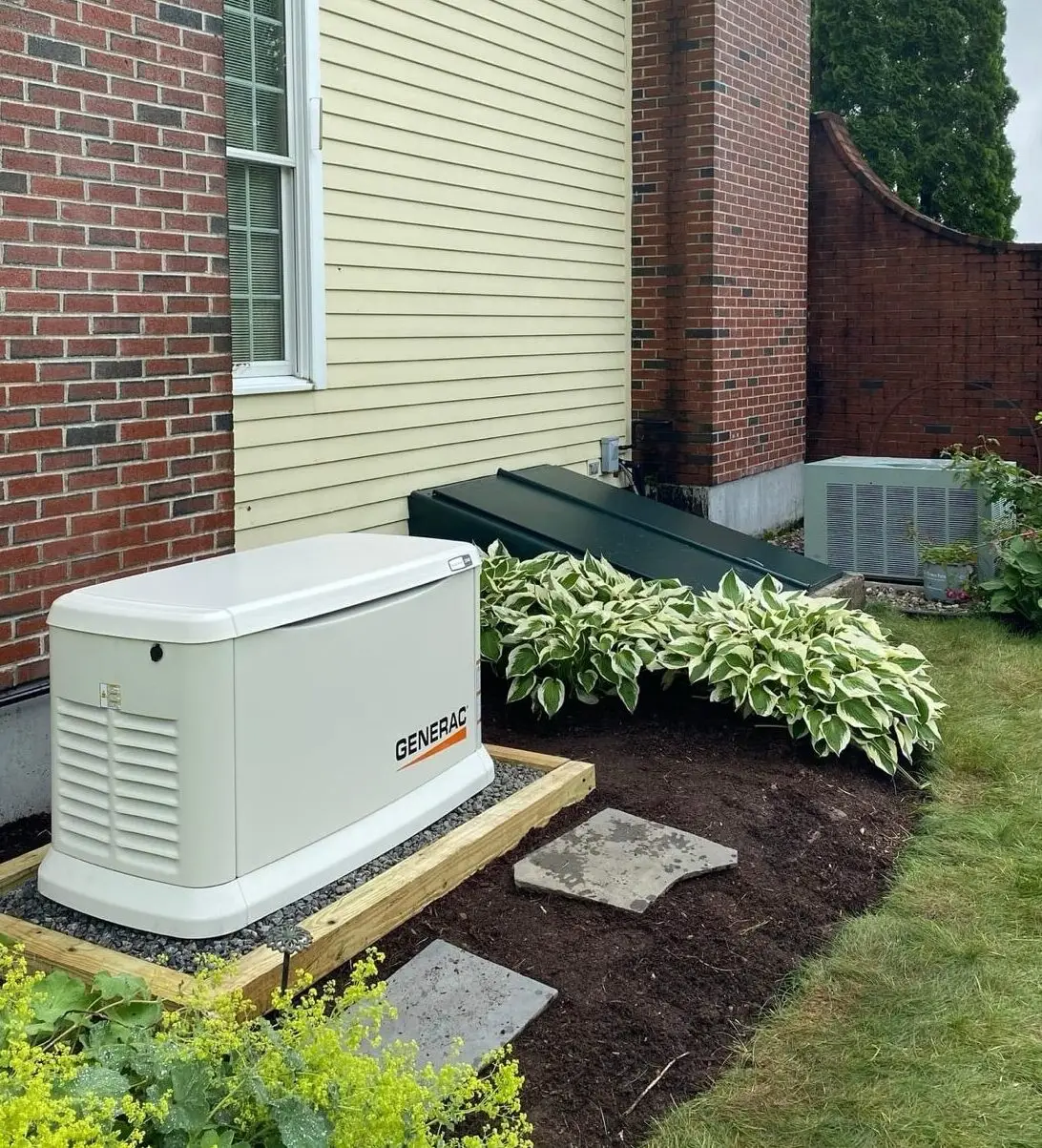A whole-home generator (also known as a standby generator) is an appliance that supplies backup electricity in the event of a power outage. They can be a convenient and even life-saving investment for your home, but they don’t come without downsides.
In this article we will provide an unbiased look at all the pros and cons of owning a whole-home generator. By the end, we hope you will have a better idea of what generator ownership entails and can confidently make a decision about whether it is the right choice for you.
Pros:
- Uninterrupted Power Supply
- Protect Your Family’s Health & Safety
- Protect Your Home From Damage
- Unbeatable Performance and Reliability
- Low-Maintenance
- More Power Capacity and Longer Run Time
- Safer Than a Portable Generator
- Increased Property Values
Cons:
- Cost
- Intensive Installation Process
- Inconsistent Use
- Local Regulations / HOA Rules to Follow
- Finding Space on Your Property
- Fuel Supply and Storage
- Hard to Transport / Can’t Use Off Property
The Pros of Whole-Home Generators
Uninterrupted Power Supply
Whole-home generators beat out all other backup power options in terms of convenience. Once your generator is installed, it can automatically detect a power outage and start working within seconds. Once power is restored, it’ll turn itself back off.
Depending on the size of your generator, it’ll be able to power most or all of your home’s systems and appliances. You’ll be able to live normally (or as close to normal as possible) despite inclement weather or power grid issues. Households with children and elderly often appreciate this aspect because it limits disruptions to your family’s daily routine.
Protect Your Family’s Health & Safety
A standby generator ensures the comfort and wellbeing of your family by supplying power to essential systems in your home:
- It keeps the food in your refrigerator from spoiling.
- It powers your HVAC so it doesn’t get too cold or too hot.
- It keeps your home security system online.
- It allows you to use kitchen appliances, lights, internet, electronics, and your hot water heater.
- If you use well water, it keeps your well pump and filtration system running so you have access to clean drinking water.
- If anyone at home relies on vital medical equipment, continued access to power can save their life.
The bottom line: If your area is prone to power outages that last for hours or days at a time, a whole-home generator will greatly improve your quality of life and safety.
Protect Your Home From Damage
Plenty of things can go wrong during a power outage, including damage to your home itself. For instance, if there is a flood, a sump pump won’t work without power. If there is a major freeze, an inoperable heating system may lead to frozen and burst pipes. If you’re out of town during an outage, you also have to worry about how property damage can worsen when you aren’t there to address it immediately.
A generator can protect your home by keeping essential systems like sump pumps and HVAC systems in operation, reducing the chance that other issues will come up and damage your home as a result of a power outage.
Unbeatable Performance and Reliability
Whole-home generators work automatically – no need to set it up, turn it on yourself, or refuel it regularly. For this reason, standby generators offer added peace of mind. In the midst of severe weather or infrastructure failure, knowing you’ll always have power can help you and your family stay calm and get through the event together.
In comparison, portable generators are unwieldy, less efficient, more complicated to use, and more dangerous to operate. If you prefer a hands-off solution, a whole-home standby generator will provide backup power while allowing you to dedicate time and energy to other things.
Low-Maintenance
While standby generators do require maintenance, it is only needed once a year to ensure it’s able to perform at a moment’s notice. An annual tune up is a small price to pay to keep your standby generator in good working condition, especially when you consider the benefits of uninterrupted power if an outage lasts for a long time. Some generators can also connect to your smartphone, allowing you to monitor performance and identify issues before they lead to bigger problems.
More Power Capacity and Longer Run Time
Whole-home generators can provide more power for longer periods of time compared to portable generators. This means you don’t have to pick and choose which areas of your home to supply power to, and you don’t have to worry about supplying enough fuel to last for days if you need it. That’s much more convenient than turning off a portable generator to refuel it every 6-12 hours, all just to power a few essential appliances.
Safer Than a Portable Generator
Generators can pose significant health risks if used unsafely. That’s why there are local regulations about where a whole-home generator can be installed and who can perform the electrical work necessary to complete the installation.
Portable generators, on the other hand, aren’t subject to the same regulations and must be operated manually. If you own a portable generator, you must take care to avoid these risks:
- Carbon monoxide (CO) poisoning: If you set up a portable generator indoors or without proper ventilation, CO can leak into your home and cause illness or death.
- Electric shock and electrocution: Be careful to keep the generator away from water, and make sure it is properly grounded to avoid electrical shock.
- Fire and burns: Generators produce a lot of heat and are fueled by flammable material. If you must refuel a portable generator, turn it off and let it cool first. Never leave a portable generator running unattended.
Increase Property Values
Although whole-home generators have a significant upfront cost, they do increase your home’s property value. Many people are willing to pay extra for a home that won’t lose power during an emergency, especially if you live in an area that frequently gets severe weather.
A standby generator could increase your property value by 3-5% according to Consumer Reports. Plus, access to backup power can save you money by eliminating additional home repair costs due to an outage. When you consider the return on investment, a whole-home generator can pay for itself and then some.
The Cons of Whole-Home Generators
Cost
There’s no way around it, whole-home generators are expensive. When you decide to buy a standby generator for your home, you need to take into account all of the upfront and ongoing costs it demands:
- Price of the generator itself: A standby generator alone will cost you a few thousand dollars, at least. The more power you require, the larger size you will need and more expensive it will be. The type of fuel a generator takes will also affect the overall cost.
- Cost of installation: In addition to the price of the generator, you will be responsible for the cost of labor for the installation, permits required, and electrical upgrades if you need them.
- Maintenance costs: You should expect to pay for a maintenance tune up every year in order to keep your generator in good working condition.
- Operational costs: Running a standby generator takes fuel, whether it be natural gas or propane. The longer you run the generator, the more you will have to pay in fuel costs.
Intensive Installation Process
The timeline for installing a whole-home generator can take anywhere from weeks to months, depending on weather conditions, product availability, and permit processing times. In other words, this process is one you have to start long before you need a generator – not when severe weather is already in the forecast.
Inconsistent Use
A whole-home generator is the kind of thing you want to have when you need it, but you hope you never need it in the first place. You never know when a power outage will occur, so it’s possible you’ll pay thousands of dollars to get a generator installed and not use it for many years. If that’s not something you’re comfortable with, then you should consider a less expensive option.
Local Regulations / HOA Rules to Follow
Part of the reason installing a generator is so intensive is because there are city and state-level regulations that must be followed. Your electrician will need to be well-informed of the local codes and able to advise you on those requirements.
If you have an HOA, there might be additional rules and restrictions about whether you can have a generator, what type of generator you can have, and how it can be used.
Finding Space on Your Property
Whole-home generators aren’t particularly small, and there are strict guidelines about where you can install them. Regulations can vary by city and state.
- Prepare to dedicate a 10’x10’ area for your generator – enough space for an electrician to access it easily and plenty of clearance to adhere to your local safety codes.
- The generator should be at least 5 feet away from windows, doors, vents or other openings into your house to eliminate hazards from dangerous fumes and high heat.
- The installation space needs to be level and elevated to keep away from flood zones and vegetation.
- If you must install the generator far away from your gas line and electric meter, it will be more expensive to install.
- If you can, find a spot that isn’t right next to a bedroom to reduce noise.
If your yard doesn’t have a lot of space, finding a good spot can get complicated. You may have to come up with a creative solution or downgrade to a smaller system than planned.
Fuel Supply and Storage
If you have a natural gas pipeline available, supplying fuel for your generator is easy – just connect it directly to the gas line. If you don’t have a gas line, you’ll need a liquid propane tank and will have to refuel or replace it when it’s empty.
Propane tanks come in many different sizes, and you’ll need space available to safely store a large propane tank or multiple smaller tanks on your property.
Hard to Transport / Can’t Use Off Property
Whole-home generators are permanently installed on your property. That means you can’t use them in other locations, such as on a camping trip or in a workshop, like you would a portable generator.
Generators are also very heavy and difficult to transport. If you decided to move and sell your house, it might not be worth the effort of taking the generator with you (assuming it would be a suitable size for your new home). If you aren’t concerned about increasing the value of your home and you plan to move out in a couple of years, you might want to hold off on getting a standby generator installed.
Making the Right Decision For Your Home
Only you can decide whether the pros of a whole-home generator outweigh the cons, but if you’d like a professional opinion, Heritage Home Service’s team of generator specialists can provide guidance about your situation and the types of backup power options available on the market.
We are available in New Hampshire, Massachusetts, and Maine for all of your home service needs – just give us a call or contact us online for a free consultation.
FREE Generator
SCHEDULE NOWFREE Generator refers to generator equipment only. Once the generator installation is completed, winners will be credited back the cost of equipment ONLY via check. Customers must put down a deposit to qualify for the free generator. Job must be completed by the first of the year to be eligible. Offer expires 12/01/25.
*NH & ME Residents ONLY

Financing Made Easy
When you choose Heritage, you can rest easy knowing that we provide straightforward options to help you budget for a complete solution that will last you for decades to come.
VIEW FINANCING OPTIONS
Complete Care Plan
With Complete Care, enjoy peace of mind knowing your home's plumbing, heating, cooling, and electrical needs are handled year after year—hassle-free, with added benefits.
VIEW PLAN







